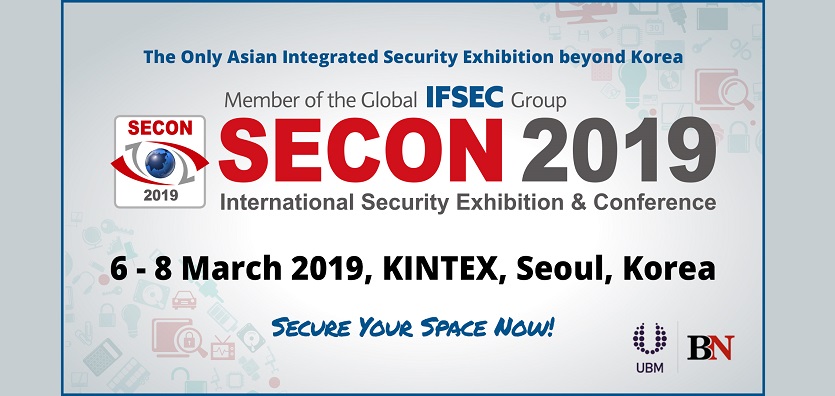
BOANNEWS & Security World have selected security issues in 2019. The top 7 issues were drawn from the annual ‘Korean Security Market Survey’ conducted by BOANNEWS & Security World and interviews with industry experts. The top 7 issues are ①Expansion of AI Image Solution Release ② Commercialization of 4K ③5G in Security Market ④IP Camera Hacking ⑤5. Expanded applicability of ‘Face Recognition’ ⑥ Will Smart City be actualised in 2019? ⑦ How would a US-China trade war Impact the security companies in Korea and China?
① Expansion of AI Image Solution Release
ICT including AI, cloud, big data, and IoT is leading a radical change in security market as it’s combining with physical security including image security. Previously, CCTV saved the image and used the saved image for after treatment. As CCTV meets AI technology based on deep learning, it is forecasted to be utilized for more safe society through proactive security.
In 2018, the release of intelligent image analysis products has expanded due to the development of image analysis technology utilizing image big data, AI, and deep learning. In 2019, the release of special equipments of various security purposes through development of edge equipments based on deep learning and storage equipments will go on. Traditional image security equipment companies such as IDIS, Rifatron, and INCON are striving for AI image analysis related technology for the medium and long term.
②Commercialization of 4K
4K had come on the scene for the first time in 2014. After the release of 8 megapixel sensors, 4K camera was released among camera manufacturing companies. In ‘CES 2014,’ which was held in January 2014, Panasonic had introduced various new 4K camera products. In July 2014, Axis Communications had released their first 4K camera in Korea. The CEO of Axis Communications also visited Korea to find out the feedback of Korean market, the top 7 security market in the world. IDIS also had released their first 4k product in the same year. However, full HD is still a major swing in Korea, because the need from public institutions, the biggest market in Korea, is not that big yet. In 2016, BOANNEWS & Security World prospected 4K to be commercialized in 2 years, but the prospect was broken. Because it has already been 5 years since 4K made its presence and 4K still cannot realize perfect visual observation. The resolution of 4K is 4 times higher than full HD (1,920 x 1,080 pixels), which means the data is a lot heavier too. This is one of the main tasks for 4K to solve. It’s also the reason why the compression technology such as H.265 is urgent. The monitor that can display 4K image is also experiencing resolution restrictions. Display is the part where 4K shows the biggest limit. To establish the high resolution image system, camera and all the other equipments should be high resolution too. However, it is impossible for current server, display device, and decoding performance to save, display, or control images taken by thousands of 4K cameras. However, 5G is expected to can take its place if it’s commercialized.
③5G in Security Market
The world is carrying out 5G actual test. Verizon, the most representative telecommunications company in USA, has announced the success of data communication using 5G net equipments. On December 1st 2018, The top 3 telecommunications companies in Korea – SK Telecom, KT, and LG U Plus, have started the commercialization of 5G. SK Telecom has selected equipment company in September and achieved “Firstcall,” which is the final stage of commercialization, making a disclosure of 5G commercialized net building site in October.
KT has announced that they have established commercialized net through 5G NSA (Non-Standalone) core equipments applying ‘CUPS(Control & User Plane Separation) technology’ with Samsung and Cisco. LG U Plus also announced that they have started 5G emission with Seoul, capital area, and part of metropolitan area as the centres, and the service through smart phones after March 2019.
As the top 3 domestic telecommunications companies have uncased their technical skills with their own strategies for 5G emissions, security market is raising sense of expectancy because mobile system which previous system could not support can take its place and bring the explosive growth. 4K could be one of beneficiaries.
However, the controversy over the safety of 5G communications network is still around. The whole world is worrying about communications equipments made by China focusing on the price and technical skills having the adoption of 5G ahead. Korea promptly organized its position, but various countries with the Commonwealth of Nations as the centres, the arguments for and against the exemption of Huawei from the establishment of 5G net are ongoing.
The Korean government is not blocking the usage of Huawei equipments, but SK Telecom and KT have given up the adoption of Huawei equipments on a social note. However, LG U Plus, which has adopted Huawei equipments since LTE, is adopting Huawei equipments again.
There is a consensus now that the control system against physical threat such as earthquakes and fire is necessary. The fire accident in KT Ahyeon branch showed all the threats that could happen when the network is out of service in the network focused hyper-connected society.
④IP Camera Hacking
As the hyper-connection of loT equipments such as IP camera is increasing, concerns over new weak points is also increasing. The safety of IP camera will be a hot issue in 2019 because the hacking of loT equipments including IP camera is increasing as the number loT equipments that can be connected to the internet is increasing. Recently, public anxiety is increasing as the leakage of IT camera image information is increasing dramatically. For this reason, the business opportunities among Korean companies which manufacture IP cameras with improved security and technical skills are expected to increase. One of the industry experts in Korea said, “Consumer Confidence Index is expected to increase if the performance and safety of IP cameras distributed in Korea strengthen through the reinforcement of KC certification. KC certification is also a solution protecting the camera manufacturing companies at the same time.”
The government reinforced the security of all the IP cameras distributed in Korea due to the IP camera hacking incidents in the past few years. For this reason, IP cameras distributed in Korea must be released with reinforced security from February. All the IP cameras distributed in Korea should set the initial password to get the KD certification and distribute legally. Also, MSIT mad related amendments to reinforce the security policies of all the IP cameras distributed in Korea covering from public to civil market.
⑤Expanded applicability of ‘Face Recognition’
With the threat of forgery or falsification in the biometrics market increasing, multimodal interface is drawing attention for its complexity to verify identity. Locally the biometrics is receiving renewed attention with the possibility of the authentication certificates being expired in the near future. The untact authentication is now being recognized as a replacement and its introduction to mobile market is reducing resistance from the public as well as accelerating the market expansion.
Biometrics systems are increasingly demanded by governments and conglomerates that require high level of security. After the experts’ review and discussion, the Korean government has decided to introduce a facial recognition system to the government office. Various biometrics systems had been reviewed; however, the face recognition was selected for its recognition accuracy, fast processing speed, and for the fact that it is highly hygienic as it does not require physical contacts. With the enlargement of the public market in Korea, expectations for the domestic biometrics market have increased significantly.
There had been a fierce competition between the face recognition and iris recognition to determine which will be the leading biometrics solution to replace fingerprint recognition. The trend shows that the face recognition is gradually becoming more predominant. While IR and visual-based verification method of face recognition are expected to construct its own areas and prosper gradually, the iris recognition is expected to see the slow growth rate due to its low user-friendliness and high costs which exceeds its excellent accuracy.
⑥ Will Smart City be actualised in 2019?
2018 was a year that started with smart city and ended with smart city. Ever since the Ministry of Land, Infrastructure and Transport launched the smart city integration platform project, the eyes from local governments as well as physical security industry are directed towards smart city. Twelve local governments have been selected to build an integrated smart city platform, laying the groundwork for becoming a smart city.
This has also had a major impact on the video security industry. If 2018 was the year to implement various projects in the early stage to build the infrastructure, the projects are expected to be expand and intensify in 2019. With this trend its is likely that the service will evolve enough for the public to notice smart city in real life. The Ministry of Land, Transport and Maritime Affairs has set a budget of 70.361 billion KRW for the smart city project this year, raising hopes of related industries. The amount is four times more than last year’s 14,261 million KRW.
‘Smart city model project’ requires large investment of budget – 26.47 billion KRW will be put into the project. Busan and Sejong City which are the model cities for smart city project will combine smart home, IoT, big data, autonomous driving car and environment friendly energy to solve complex problems of urban problems and improve the quality of life, while fostering smart city as a new future growth engine for the nation through the creation of innovative industry ecosystem.
⑦How would a US-China trade war Impact the security companies in Korea and China?
The security industry in Korea and China is both worried and excited about the impact of the US-China trade war. According to the business type of their imported products, the companies that export finished products to the US are hoping the market would be expanded due to the increased price driven by the increased tax, while the companies that export the intermediary products to China and the finished products to the third countries are concerned about the current situation.
Most of the Korean companies export their finished products to the US and the third country after importing the intermediary products from China. However, the security companies are targeting the specific ‘security’market, therefore, they are expecting that the US-China trade war and the strong national security policy of the US would positively affect the security market.
The Korea’s security equipment manufacturers that are struggling to export to the US due to the Chinese companies are now preparing to beat out the China with made-in-Korea products. They are not feeling the direct impact of the US-China trade war yet, however, they are now trying to develop new product lines for the US market expecting that the prolonged conflict between the two countries will lead to the slowdown of Chinese economy and to the decrease of the exports to the US.
One of the Korean companies, IDIS is showing anticipation that the increased export tax targeting Chinese products would give price competitiveness to the Korean companies and it will give more opportunities for the Korean security industry to enter the US market. Hanwha Techwin is also regrouping to target the overseas market especially North America and the Europe.
Please contact SECON 2019 organizing committee(global@seconexpo.com) for other inquiries about the exhibition.
About UBM Asia
UBM Asia recently became part of Informa PLC, a leading B2B information services group and the largest B2B Events organiser in the world. Please visit www.ubm.com/asia for more information about our presence in Asia.
SECON is organised by UBM BN, which in June 2018 combined with Informa PLC to become a leading B2B information services group and the largest B2B Events organiser in the world. Please visit www.ubm.com/asia for more information about our presence in Asia.






